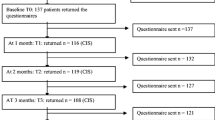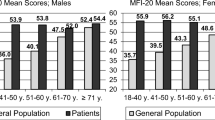Abstract
Goals of work
Cancer-related fatigue is a very frequent problem in cancer, interfering with many patients’ life activities. Anaemia is present in a large number of fatigued patients. The aim of this study was to evaluate cancer-related fatigue, in relation with haematic haemoglobin levels and the presence of anxiety and depression.
Materials and methods
The Functional Assessment Of Chronic Illness Therapy—Fatigue scale was used to assess fatigue. The Hospital Anxiety and Depression Scale was administered to screen for psychological distress. Haematological values were measured by blood tests. All data were analysed using Chi-squared, and a logistic regression analysis was conducted.
Main results
Eighty patients were enrolled in the study. Significant associations were found between fatigue and depression, fatigue and anxiety and between fatigue and haemoglobin.
Conclusion
Anxiety and depression, other than heamoglobin levels, were found associated with fatigue. Hence, implications for a multi-dimensional treatment of fatigue are discussed.
Similar content being viewed by others
References
Balducci L (2003) Epidemiology of in the elderly: information on diagnostic evaluation. J Am Geriatr Soc 51(3 Suppl):S2–9
Bennet B, Goldstein D, Lloyd A et al (2004) Fatigue and psychological distress—exploring the relationship in women treated for breast cancer. Eur J Cancer 40(11):1689–1695
Bower JE (2005) Prevalence and causes of fatigue after cancer treatment: The next generation of research. J Clin Oncol 23:8280–8282
Brown D, McMillan DC, Milroy R (2005) The correlation between fatigue, physical function, the systemic inflammatory response, and psychological distress in patients with advanced lung cancer. Cancer 103(2):377–382
Cella D, Lai J, Chang CH et al (2002) Fatigue in cancer patients compared with fatigue in the general United States population. Cancer 92(2):528–538
Costantini M, Musso M, Viterbori P et al (1999) Detecting psychological distress in cancer patients: validity of the Italian version of the hospital anxiety and depression scale. Support Care Cancer 7(3):121–127
Curt GA, Breitbart W, Cella D et al (2000) Impact of cancer-related fatigue on the lives of patients: new findings from the fatigue coalition. The Oncologist 5:353–360
Derogatis LR, Morrow GR, Fetting J et al (1983) The prevalence of psychiatric disorders among cancer patients. JAMA 49(6):751–757
Geiser F, Hahn C, Conrad R et al (2007) Interaction of psychological factors and the effect of epoetin alfa treatment in cancer patients on haemoglobin and fatigue. Support Care Cancer 15(3):273–278
Holzner B, Kemmler G, Greil R et al (2002) The impact of haemoglobin levels on fatigue and quality of life in cancer patients. Ann Oncol 13:965–973
Hopwood P, Stephens RJ (2000) Depression in patients with lung cancer: prevalence and risk factors derived from quality-of-life data. J Clin Oncol 18:893–903
Irvine D, Vincent L, Graydon JE et al (1994) The prevalence and correlates of fatigue in patients receiving treatment with chemotherapy and radiotherapy. A comparison with the fatigue experienced by healthy individuals. Cancer Nurs 17:367–378
Lai JS, Cella D, Chang CH et al (2003) Item banking to improve, shorten and computerize self-reported fatigue: an illustration of steps to create a core item bank from the FACIT-Fatigue Scale. Qual Life Res 2(5):485–501
Loge JH, Abrahamsen AF, Ekeberg Ø et al. (2000) Fatigue and psychiatric morbidity among Hodgkin’s disease survivors. J Pain Symptom Manage 19:91–99
Ludwig H, Van Belle S, Barrett-Lee P et al (2004) The European Cancer Survey (ECAS): a large, multinational, prospective survey defining the prevalence, incidence, and treatment of in cancer patients. Eur J Cancer 40(15):2293–2306
Mock V (2004) Evidence-based treatment for cancer-related fatigue. J Natl Cancer Inst Monogr 32:112–118
NCCN Clinical Practice Guidelines in Oncology. Cancer-Related Fatigue V.2.2007. Rockledge, PA. Available at: www.nccn.org
National Cancer Institute (NCI). Common toxicity criteria version 2
Osterborg A, Brandberg Y, Molostova V et al (2002) Randomized double blind placebo-controlled trial of recombinant human erytropoietin, epoetin beta, in haematologic malignancies. J Clin Oncol 20:2486–2494
Portenoy RK, Itri LM (1999) Cancer-related fatigue: guidelines for evaluation and management. The Oncologist 4:1–10
Razavi D, Delvaux N, Farvacques C, Robaye E (1990) Screening for adjustment disorders and major depressive disorders in cancer in-patients. Br J Psychiatry 156:79–83
Rubin GJ, Cleare A, Hotopf M (2004) Psychological factors in postoperative fatigue. Psychosom Med 66(6):959–964
Ruffer JU, Flechtner H, Tralis P et al (2003) Fatigue in long-term survivors of Hodgkin’s lymphoma: a report from the German Hodgkin Lymphoma Study Group. Eur J Cancer 39:2179–2186
Servaes P, Verhagen S, Bleijenberg G (2002) Determinants of chronic fatigue in disease-free breast cancer patients: a cross-sectional study. Ann Oncol 13:589–598
Servaes P, Verhagen S, Schreuder HW et al (2003) Fatigue after treatment for malignant and benign bone and soft tissue tumors. J Pain Symptom Manage 26:1113–1122
Stone P, Richards M, Hardy J (1998) Fatigue in patients with cancer. Eur J Cancer 34:1670–1676
Wagner LI, Cella D (2004) Fatigue and cancer: causes, prevalence, and treatment approaches. Br J Cancer 91:822–828
Yates P, Aranda S, Hargraves M et al (2005) Randomized controlled trial of an educational intervention for managing fatigue in women receiving adjuvant chemotherapy for early-stage breast cancer. J Clin Oncol 25:6027–6036
Zigmond AS, Snaith RP (1983) The hospital anxiety and depression scale. Acta Psychiatr Scand 67:361–370
Acknowledgement
Thanks to Mr. B. Stea for his help in statistical review.
Author information
Authors and Affiliations
Corresponding author
Rights and permissions
About this article
Cite this article
Romito, F., Montanaro, R., Corvasce, C. et al. Is cancer-related fatigue more strongly correlated to haematological or to psychological factors in cancer patients?. Support Care Cancer 16, 943–946 (2008). https://doi.org/10.1007/s00520-007-0357-1
Received:
Accepted:
Published:
Issue Date:
DOI: https://doi.org/10.1007/s00520-007-0357-1




